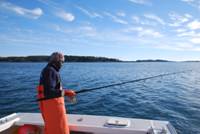Dr. Willis received both his M.S. and Ph.D. from the University of Wisconsin – Madison in the Limnology and Marine Sciences Program. He conducted his graduate work at the North Temperate Lakes Long Term Ecological Research site located in Vilas Co., WI. There he studied the interactions between invasive species, climate change and human population in a rural forested landscape, focusing on effects manifested in lake fish communities over time. After graduating in 2003, Dr. Willis moved to Toronto, ON where he did a one year post-doctoral fellowship in the Dept. of Zoology under Dr. Don Jackson, focused on building expertise in multivariate analytical methods. In 2004-2005 Dr. Willis worked for Maine Rivers as a project biologist on an international, multi-agency investigation of how searun alewife and smallmouth bass interact in eastern Maine lakes. The project entailed a life history analysis of smallmouth bass data collected by Maine’s Dept. of Inland Fisheries and Wildlife, New Brunswick’s Dept. of Natural Resources, and local bass fishing clubs. Additional new data was collected on alewife and smallmouth bass diet habits in several eastern Maine lakes. In 2006 Dr. Willis joined the University of Southern Maine Aquatic Systems Group. From 2006 through 2011 his research focused on the role alewife (Alosa pseudoharengus) occupy in the ecosystems connected to the Gulf of Maine. In particular, alewives interact with the nearshore ocean, riverine and lake food webs, contribute to nutrient cycling in coastal watersheds, are seasonal prey for fish, birds and mammals, and interact with much of the infrastructure humans use to harness and use water resources in coastal watersheds. Investigations and projects included freshwater food webs, food webs in the nearshore Gulf of Maine, historic abundance and distribution of alewife, and the stock structure of alewife in the Gulf of Maine. The Kennebec and Penobscot Rivers are focus areas of Dr. Willis’s current projects. The Kennebec River is the site of a collaborative project with Bowdoin and Bates Colleges on recovery trajectories of the Kennebec and Androscoggin Rivers, funded by Maine EPSCOR Science and Sustainability Initiative. The project was highlighted in a MPBN documentary, “Desperate Alewives”. Dr. Willis has been involved in radio tagging and tracking work on alewives in the Penobscot River related to the Penobscot River Restoration Project. He is also a board member for the Alewife Harvesters of Maine.

